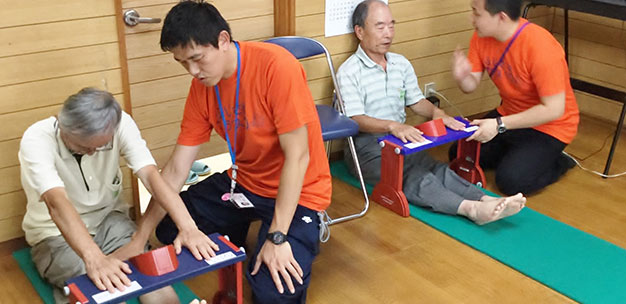Exercise may hold the key to reducing cognitive decline in aging populations
Published online 29 October 2015

Elderly residents in the central-eastern city of Fujisawa, Japan, exercising as part of Keio University's '+10 project' to increase their daily activity by ten minutes.
© 2015 Yayoi Kibayashi, Keio University
Modern medicine faces a dilemma of its own making. While people have longer lifespans, aging populations can become an unmanageable burden for healthcare systems. The resolution may lie in readjusting what we classify as healthcare.
As the country with the world's oldest population, Japan is particularly attuned to the specific ailments of senior citizens. Dementia already afflicts more than three million Japanese and will affect more lives as the population continues to age. At Keio University's Sports Medicine Research Center, researcher Yuko Oguma is investigating whether regular exercise, which reduces the risk of obesity, heart disease, and depression, could also help delay cognitive decline. "Preventing cognitive decline is a national problem," she says. "It is very important for our society to work on health management and not just medication."
Step by step
Oguma's approach focuses on prevention over treatment. Recalling her early career as a physician at Keio University Hospital, she says, "I saw lots of patients with serious diseases, such as cardiovascular diseases and cancer, and I started to think about how to prevent or postpone their diseases by improving their lifestyles." Oguma continued this research when she moved to Boston to attend the Harvard T.H. Chan School of Public Health as a graduate student. Now an associate professor at Keio, she aims to reduce the number of people with obesity and cognitive decline by improving public health and reducing society's healthcare burden.
Research by Oguma1 and others has shown that even a modest increase in daily physical activity can make a difference. Regular activity, such as walking to work or the store, climbing stairs, or even gardening, lowers the risk of heart disease, diabetes, and depression, as well as helping to prevent obesity and knee or lumbar pain. Oguma incorporated these findings as part of a team conducting a systematic review for Japan's Ministry of Health, Labour and Welfare into new guidelines for physical activity in 2013. The guidelines recommend 60 minutes of moderate to vigorous daily physical activity as optimal, but emphasize that as little as ten minutes a day is beneficial.
An activity a day
Oguma now runs the Graduate School of Health Management's '+10 project', a combined research program and public health initiative, which aims to increase senior citizens' daily physical activity by ten minutes. The program targets elderly communities in the coastal city of Fujisawa, organizing calisthenics groups and offering training videos and support. "Doing ten minutes of physical activity is better than nothing," she explains. "Sixty minutes would be much better, but ten minutes is a good start."
Physical activity is known to increase blood flow to the brain and to increase the concentration of a protein important for neuronal growth and maintenance called brain-derived neurotrophic factor. Using data from the +10 project, Oguma hopes to discover whether increased physical activity can prevent cognitive decline. Her team, in collaboration with dementia specialists at Keio University's School of Medicine, uses questionnaires and an iPad application to assess participants' cognitive function.
The graduate school is also using the 2020 Tokyo Olympics to raise awareness. "Instead of just watching athletes do sports on television, this is a very good opportunity to increase physical activity in the population," Oguma says. "I want physical activity to become part of people's routine. If people can lead healthier lives within their communities, our aging population will put less strain on the healthcare system."
Reference
- Oguma, Y. et al. Physical activity decreases cardiovascular disease risk in women. American Journal of Preventive Medicine 26, 407-418 (2004). | article